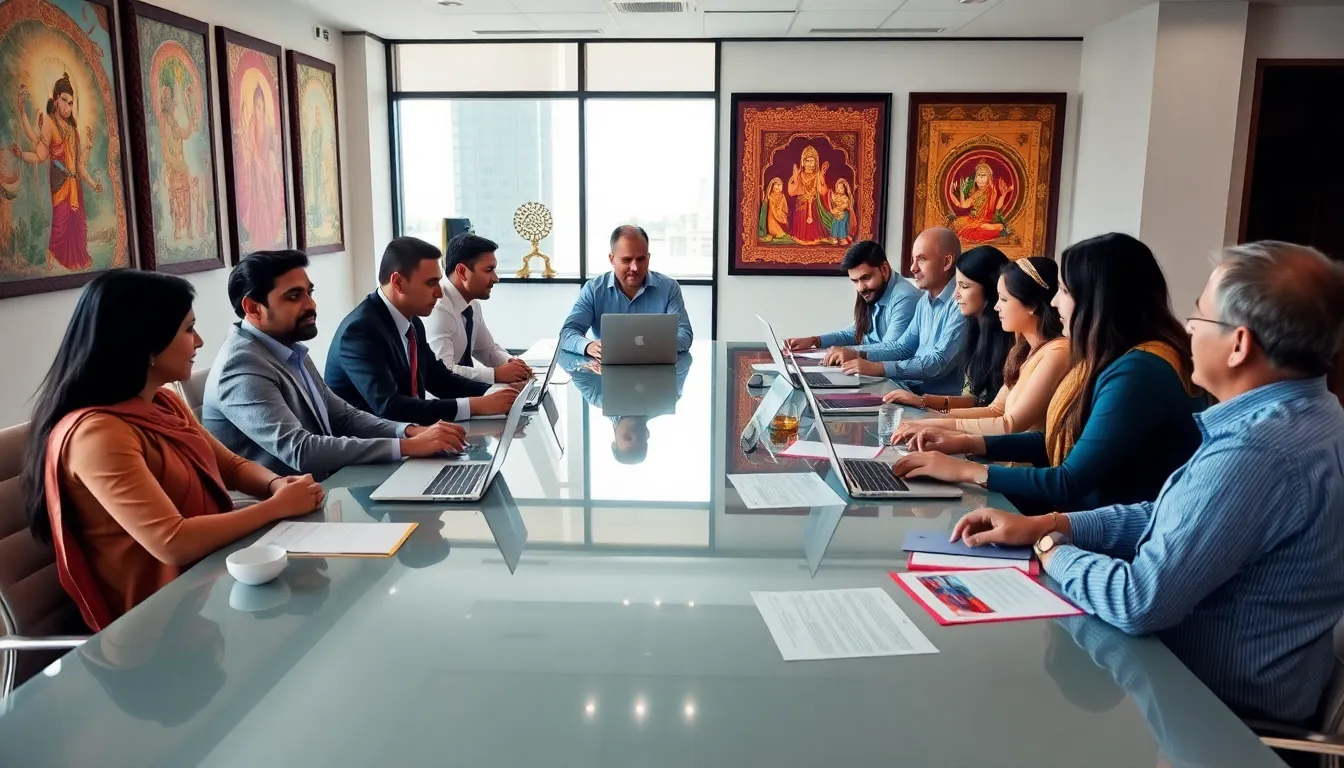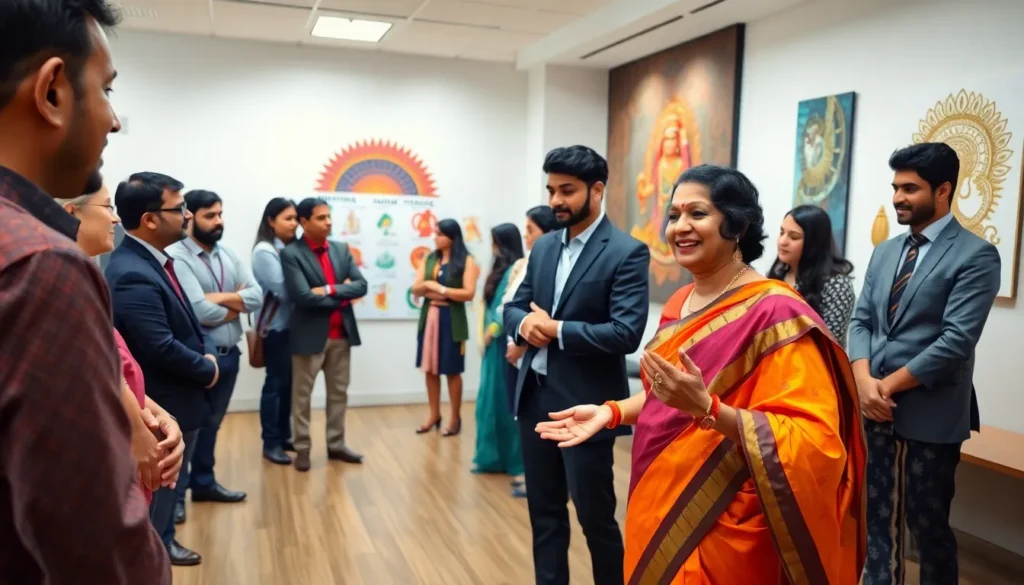Imagine a vibrant tapestry woven with threads of philosophy, art, and tradition. That’s Hindu culture for you. It’s like a rich curry, spicy, diverse, and full of unexpected flavors. In the world of global cultures, Hinduism stands out with its vast historical depth and colorful traditions that still resonate today. Whether you’re sipping chai in a temple courtyard or majoring in anthropology, this exploration of the Hindu Cultural Society will tantalize your intellect and stir your curiosity. Buckle up, because this journey is about to get interesting.
Table of Contents
ToggleHistorical Overview of Hindu Culture

Hindu culture traces its roots back thousands of years, making it one of the oldest continuous cultures in the world. The Indus Valley Civilization (circa 3300–1300 BCE) lays the groundwork for what would evolve into a rich tapestry of beliefs and practices that still thrive today. From the Vedas, the oldest sacred texts, to the epics of the Mahabharata and Ramayana, these literary treasures serve as a window into the spiritual and philosophical life of ancient Hindus.
Over the centuries, the culture has absorbed influences from various invaders and traders, melding local traditions with ideas from Persia, Greece, and beyond. This adaptability has created a dynamic culture that not only preserves its core values but also welcomes new ideas.
Historically, the caste system, although controversial, has played a significant role in shaping social structure in India. It structured society into groups, influencing everything from occupation to marriage. But, it is important to note that reform movements have arisen over the centuries to challenge its rigidity and promote social equality. Understanding these historical shifts provides insight into the evolution of the Hindu Cultural Society as we know it today.
Key Beliefs and Values
At the heart of Hindu culture lies a plethora of beliefs and values that govern daily life. One of the foremost tenets is Dharma, which denotes duty, righteousness, and moral law. Every individual’s dharma varies based on age, caste, and gender, guiding them towards a meaningful life.
Another essential belief is Karma, the principle that actions have consequences, not just in this life but also in future reincarnations. This connection to the cycle of life and death (samsara) is a compelling aspect of Hindu philosophy.
Moksha, or liberation from the cycle of rebirth, represents the ultimate goal. Achieving moksha allows the soul to merge back with the universal spirit, highlighting a sense of spiritual transcendence.
Respect for all living beings is ingrained in the culture, leading to widespread vegetarianism among many Hindus. Meditation, prayer, and rituals play a huge role in daily practice, as they are ways to connect with the divine. The values of compassion, non-violence, and humility are deeply embedded in the collective consciousness of the community.
Traditions and Practices
Traditions within Hindu culture are as diverse as its people. Festivals like Diwali, the Festival of Lights, showcase the exuberance and communal spirit of the culture. Each festival holds its own significance, rituals, and mythology, often focused on the triumph of good over evil.
Rituals like Puja, or worship, form an everyday aspect of many Hindus’ lives. Offerings of flowers, fruits, and incense are made to deities, creating a spiritual atmosphere.
Another notable tradition is Yoga, which is not just a form of physical exercise but a holistic approach to life, encompassing the mind, body, and spirit. It emphasizes balance, peace, and introspection, values that have captivated global audiences.
Family plays a crucial role in Hindu society. Household rituals often bring families together, with ceremonies marking occasions such as births, marriages, and even the passing of loved ones. The importance of joint family systems illustrates a commitment to family values and intergenerational ties.
Art and Architecture in Hindu Culture
Hindu culture is renowned for its astounding contributions to art and architecture. Temples, often intricately carved, serve as not just religious centers but also as embodiments of the artistry inherent in this culture. The Brihadeeswarar Temple in Tamil Nadu is a testament to the architectural marvels that dot the Indian landscape, showcasing the craftsmanship and devotion of the era.
Artistic expressions extend beyond architecture, encompassing dance, music, and painting. Bharatanatyam and Kathak are two classical dance forms rich in storytelling and spirituality, weaving narratives from Hindu mythology into elaborate performances.
On the canvas, artists have captured scenes from epics and daily life, communicating profound philosophical messages. Paintings like those found in the Ajanta Caves have not only preserved artistic traditions but also served as historical records of society.
Modern Influence and Global Presence
In recent years, Hindu culture has transcended geographical boundaries, influencing various aspects of life worldwide. Yoga, meditation, and Ayurvedic practices have gained immense popularity in the West, showcasing the spiritual wisdom inherent in Hindu traditions.
Cultural festivals hosted globally, like Holi and Diwali, invite everyone to join in the celebration, dismantling barriers and offering a glimpse into the vibrancy of Hindu heritage.
Bollywood cinema, with its colorful storytelling and elaborate musicals, has also played a significant role in introducing Hindu narratives to global audiences. These films often draw on themes of love, family, and morality, resonating with viewers irrespective of their cultural backgrounds.
But, the relationship is not merely one-sided. Global interactions have also led to shifts within Hindu communities, integrating new interpretations and adaptations of age-old traditions.
Challenges Facing Hindu Culture Today
Even though its rich heritage, the Hindu Cultural Society faces several challenges in contemporary times. Globalization has both enriched and diluted traditional practices. While many have embraced advancements in technology and new cultural exchanges, some worry about the erosion of their ancient traditions.
Also, social issues such as caste discrimination and gender inequality continue to pose significant challenges within society. Efforts towards reform and inclusivity are ongoing, though the journey is fraught with complexities.
Also, political discourse surrounding the religion often overshadows its cultural values, leading to communal tensions and misunderstandings. These challenges require an ongoing dialogue, fostering an environment that celebrates diversity while nurturing the essence of Hindu identity.





